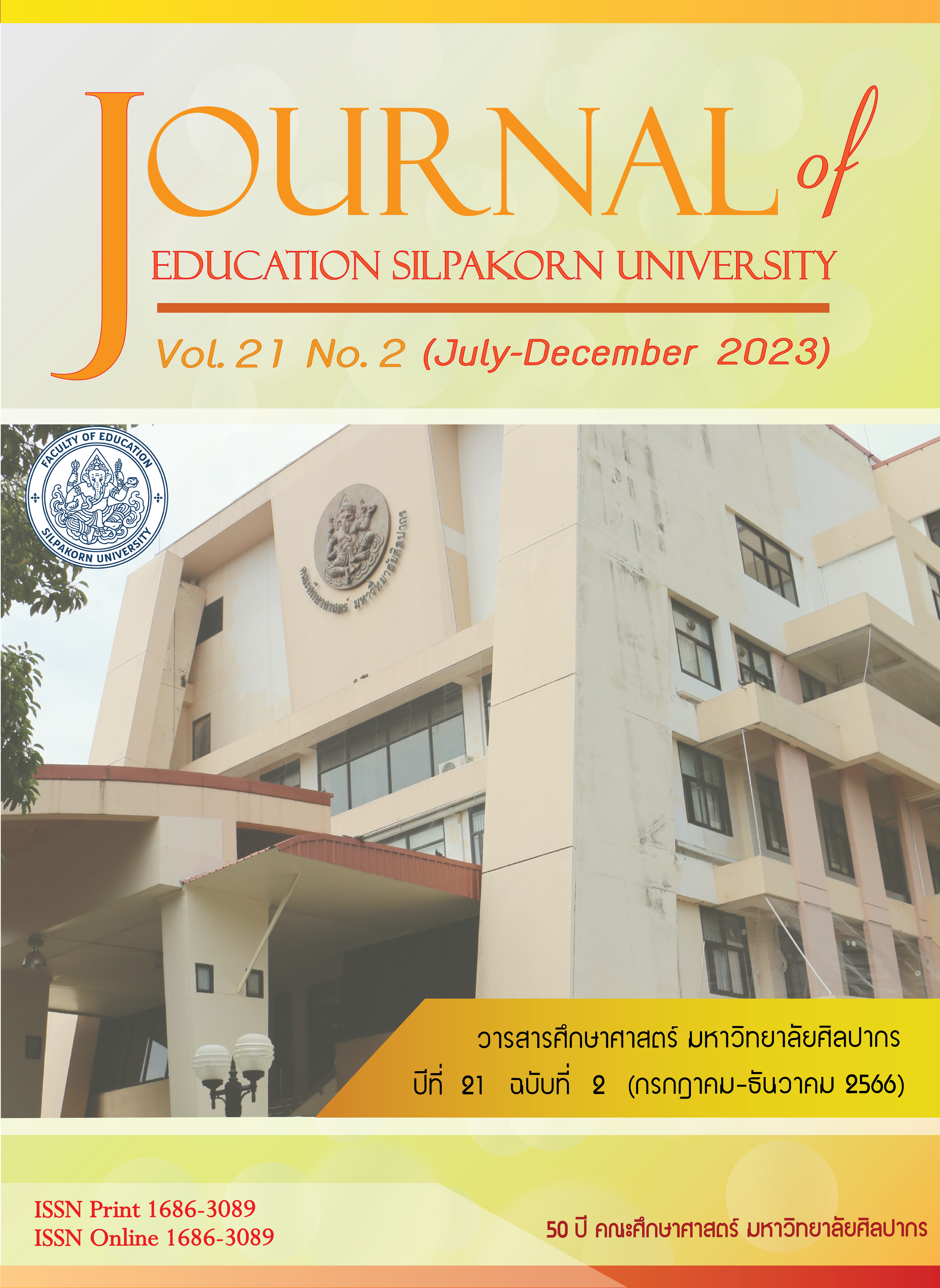Development of Research Article Reading Ability for English Major Students Using Reading Instructional Model Based on Task- Based Learning Approach
Main Article Content
Abstract
This experimental research aimed to 1) compare the English majors’ research article reading ability before and after learning through reading instructional model based on task-based learning approach and 2) study English major students’ opinion towards reading instructional model based on task-based learning approach. The samples of this study were 73 English major students of the academic year 2021 obtained by cluster random sampling. The study was implemented in the second semester of the academic year 2021; lasted 8 weeks, 3 hours per week, 24 hours in total. The research instrument comprised 1) lesson plans according to reading instructional model based on task-based learning approach, 2) pretest and posttest to examine research article reading ability, and 3) a questionnaire on the satisfaction towards reading instructional model based on task-based learning approach. The data were analyzed via mean. percentage, standard diviation, and t-test dependent. The findings revealed; 1) the students’ research reading ability after learning through reading instructional model based on task-based learning approach was significantly higher than that of the pre-learning at the .05 statistical significance level, and 2) the students’ opinion towards reading instructional model based on task-based learning approach was found in the overall picture at the ‘strongly agree’ level.
Article Details

This work is licensed under a Creative Commons Attribution-NonCommercial-NoDerivatives 4.0 International License.
References
ภาษาไทย
คณะครุศาสตร์ มหาวิทยาลัยราชภัฎสวนสุนันทา. (2560). หลักสูตรครุศาสตรบัณฑิต สาขาวิชาภาษาอังกฤษ (หลักส๖รปรับปรุง พุทธศักราช 2560). กรุงเทพฯ:
มหาวิทยาลัยราชภัฏสวนสุนันทา.
ภาษาอังกฤษ
Araujo, A. & Slomski, V. (2013). Active Learning Methods - An Analysis of Applications and Experiences in Brazilian Accounting teaching.
Creative Education, 4, 20-27. Best, John, W. and Kahn, J.V. (1986). Research in education. Englewood Cliffs: Prentice-Hall, Inc.
Carr, R., Palmer, S. & Hagel, P. (2016). Active Learning: The Importance of Developing a Comprehensive Measure. Active Learning in
Higher Education 16: 173-186.
Clément, Richard & Kruidenier, B.G.. (2022). Motivation, self-confidence and group cohesion in the foreign language classroom. Journal of
Language and Social Psychology 4: 21-37.
Cohen, L., Manion, L. & Morrison. K. (1996). A guide to teaching practice. London: Routledge.
Echiverri, Leah & Lane, Keith. (2019). Influence of Learning Attitudes and Task-Based Interactive Approach on Student Satisfaction and
Perceived Learning Outcomes in a Content and Language Integrated Learning (CLIL) University Course in China. Ressearchgate
[Online]. Retrieved April 5, 2022, from https://www.researchgate.net/publication/333347281.
Ellis, R. (2003). Task-based language learning and teaching. Oxford: Oxford University Press.
Facione, P.A., (1984). Toward a theory of critical thinking. Liberal Education 70: 253–261.
Hong-qin, Y. (2007). Application of TBT in reading class. US-China Education Review 4(5): 39-42.
Hudson, T. (2007). Teaching second language reading. Oxford: Oxford University Press.
Jamila, S. & Maslawati, M. (2017). Identifying the Effectiveness of Active learning Strategies and benefits in Curriculum and Pedagogy
Course for Undergraduate TESL Students. Creative Education 8(14): 2312 - 2324.
Kim, Y. & McDonough, K. (2011). Using pretask modelling to encourage collaborative learning opportunities. Language Teaching
Research 15(2): 183–199.
Long, M. H. (1983). “Native speaker/non-native speaker conversation and the negotiation of comprehensible input.” Applied Linguistics
(3): 126-141.
Long, M., & Crookes, G. (1992). “Three approaches to task-based syllabus design.” TESOL Quarterly 26(1): 27-56.
Nunan, D. (2004). Task-based language teaching. Cambridge: Cambridge University Press.
Prabhu, N. S. (1987). Second language pedagogy. Oxford, UK: Oxford University Press.
Wallace, C. (2003). Critical Reading in Language Education. New York: Palgrave Macmillan.
Willis, J. (1996). A framework for task-based learning. London: Longman.


